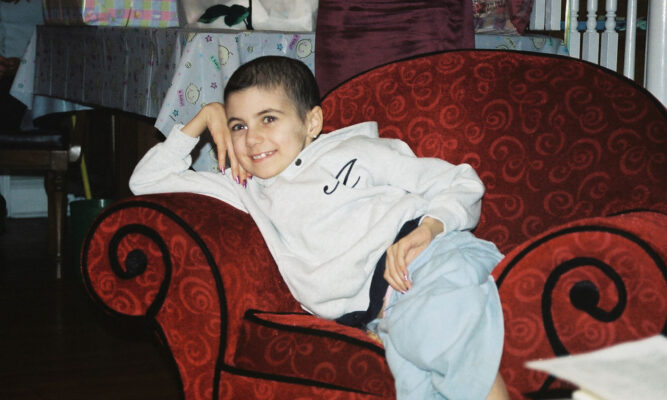Starting with one lemonade stand in 2000, Alexandra “Alex” Scott’s brave and industrious spirit propelled her to raise $1 million toward a world without pediatric cancer before she passed away at age 8. Alex’s Lemonade Stand Foundation (ALSF) was established by her parents to continue Alex’s movement, and it has raised more than $250 million supporting innovative research and care for children diagnosed with cancer. Recent grant awards from ALSF totaling more than $1.2 million support Dana-Farber Cancer Institute investigators in pursuing cutting-edge research to address urgent needs in pediatric solid and blood cancers.
Mimi Bandopadhayay, MBBS, PhD, received the “A” Award Grant to pursue her research on different genetic changes that drive pediatric high-grade gliomas when they occur together with mutations to histone proteins. Bandopadhayay will use genomic methods to understand the mechanisms underlying these effects and the interplay of different histone mutations, with the goal of developing novel therapies for pediatric high-grade gliomas and applying the insights gained through this research across cancers.
Jessica Tsai, MD, PhD, a postdoctoral research fellow in the Bandopadhayay lab, received a Young Investigator Award to build on her discovery that almost one in 10 diffuse intrinsic pontine gliomas have elevated levels of the FOXR2 protein. FOXR2 accelerates cancer growth and may have potential as a new target for cancer treatment. With this grant, Tsai will analyze how FOXR2 leads to cancer formation with an eye towards identifying treatments for these currently incurable brain tumors.
Two grants were awarded to Loren Walensky, MD, PhD, to support his efforts to advance next-generation therapies for treatment-resistant childhood cancers. The first will support work to move a triple-action agent known as a stapled peptide degrader from the laboratory to the bedside with the potential to target several cancer-driving pathways at once in a broad spectrum of pediatric cancers. The second will help Walensky continue developing stapled BH3 peptides to overcome resistance to venetoclax, a drug whose use is rapidly expanding in childhood and adult blood cancers to trigger cell death in tumor cells.
Co-funded by ALSF and the RUNX1 Foundation, an Early Career Investigator Grant was awarded to Waihay Wong, MD, PhD, to support his study of how inflammatory proteins contribute to the immune response in blood cells lacking normal RUNX1 function. Wong is focusing on the protein NLRP3 to determine whether inhibiting its action could stop harmful inflammation and the development of blood cancers.
“Bringing hope to children diagnosed with cancer and their families requires dedication to research over many years,” said Liz Scott, co-executive director of ALSF. “This is why we believe in funding early career scientists as well as established investigators and why we continue partnering with Dana-Farber in pursuit of therapies that will be more innovative and impactful than ever before.”



